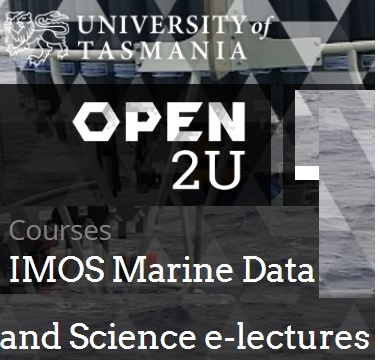Free e-lectures on Integrated Marine Observing System (IMOS) Marine DATA and SCIENCE

Free e-lectures on Integrated Marine Observing System (IMOS) Marine Data and Science are designed for marine scientists. These self-paced lectures are designed to be topic-specific to provide you with a hands-on approach to learning by teaching you how to use real ocean observational datasets collected by the Integrated Marine Observing System.
There are three different topics covered in these lectures:
- Ocean Primary Productivity,
- the Carbon Cycle and
- Acidification.
The modules were developed by the Integrated Marine Observing System (IMOS) in collaboration with the Australian Ocean Data Network (AODN), the Institute for Marine and Antarctic Studies (IMAS) and the Australian Institute of Marine Science (AIMS).
Learning outcomes:
By the end of this course, You will:
- know the basics of ocean primary productivity/ ocean carbon cycle/ ocean acidification;
- be able to explain which processes are involved in primary productivity/carbon cycle/ocean acidification, how it is measured and why it is important;
- learn different methods of ocean observing including in situ and remote sensing and how these observations can be used;
- gain knowledge of the advantages of open data and know where to find ocean data through the Australian Ocean Data Network or other databases and how to access these datasets;
- gain experience on how to analyse and interpret the data with options given on coding languages to achieve this. The data laboratories are developed in Matlab and either in R or Python, or both.
SOURCE: Free e-lectures on Integrated Marine Observing System (IMOS) Marine Data and Science.
RELATED:
GODAN e-learning course on Open Data Management in Agriculture and Nutrition & related resources/courses on Data Management
Free Open Science TRAINING e-courses (FOSTER)
Special Issue "Earth Observation Data Cubes", Special Issue Editors, A special issue of Data (ISSN 2306-5729). Deadline for manuscript submissions: 30 April 2019
Follow @AIMS_Community on Twitter... And, thanks again for your interest!

